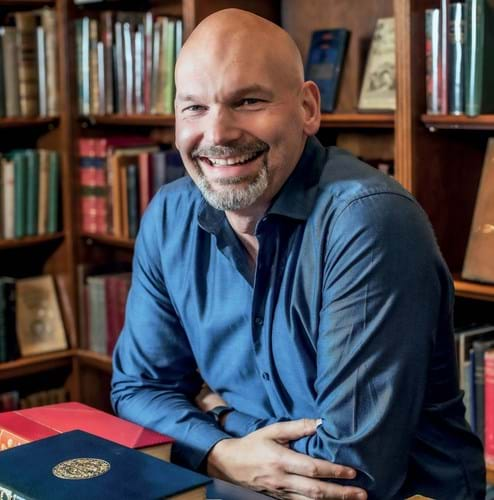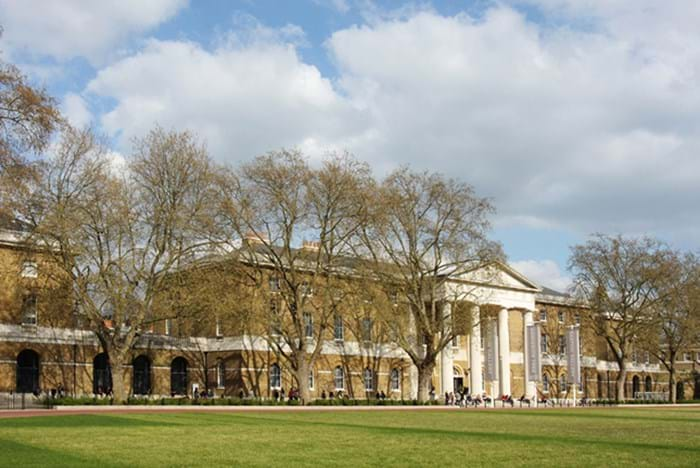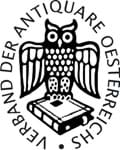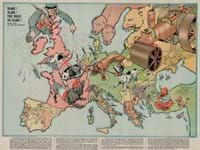
The Antiquarian Booksellers’ Association appointed a new council following its AGM in March. Deborah Coltham (Deborah Coltham Rare Books) will serve as vice-president and Daniel Crouch (Daniel Crouch Rare Books) will continue as treasurer, while taking over from Roger Treglown as the association’s president is Pom Harrington of Peter Harrington Rare Books.
ATG sat down in a socially distanced manner and asked him some questions.
ATG: How difficult has trading been since the onset of the pandemic?
Pom Harrington: Following a strong end to 2019 and an optimistic new year in January 2020, the world markets began to be unnerved by the emergence of Covid-19 in February 2020. The first few weeks affected business and, of course, this continued into March. However, by spring we had adjusted to our workfrom- home schedule, with mail and web orders running smoothly and subsequently we started to pick up pace once again. May was in fact a normal trading month and since then business has been excellent.
The book trade was transformed by the internet search engine. Has Covid accentuated this?
I believe Covid has provided collectors new-found time to spend with their collections, re-evaluate what they felt was missing and subsequently buy new items to fill in lacking areas. Furthermore, with time on their hands, new collectors have hit the web and as a business we have seen an increase in this sort of activity. Lastly, collectors who had previously been shy about buying online have been forced to use it. There is little doubt in my mind that this period has moved the market forward.
What one thing has the Covid era taught you – and other booksellers – about the trade that you didn’t previously know?
I think there are more book buyers and collectors out there than we realised.
Should we fear the decline of the faceto- face transaction?
I do not think so. Book collectors and dealers for the most part enjoy the social interaction with their fellow bibliophiles. In addition to physical events and bookstores, we have now learnt how to conduct video conferencing with new clients. This opens the world up quite a bit.
What is the role of the ABA and how will you seek to influence the direction of travel at the association?
There are several purposes of the Antiquarian Booksellers’ Association: to uphold and maintain good practices for the trade; to promote the interests of the trade; maintain good communications and links with other associations worldwide and organise book fairs and events.
There are two challenges we as an association will face during the coming year:
1. To reflect on the changing nature of book fairs. Firsts London, the ABA’s annual premier rare book fair, will be held at a new venue in October, Saatchi Gallery, and we are continuing to develop our online fairs as they have been a great platform to keep our members and the trade engaging during the pandemic.
2. Security. The improvement of registering missing books and encouraging the trade into the practice of checking if books have been reported missing. ILAB (International League of Antiquarian Booksellers) is launching a new Missing Books Register this summer. We are switching to this system.
What single change would you like to make to the association?
Expand the membership, to encourage all professional rare book dealers to join. We are adding a new trade-only book fair this summer, improved online book fairs and other initiatives that are helping the association diversify its offerings. There are more reasons to be a member these days.
As chairman of the Firsts fair you championed some notable (sometimes controversial) initiatives: the move from Olympia, the renaming of the fair and the bringing together of four events into a single week. As president of the ABA, what bold idea would you like the association to discuss?
While I continue to hold the position of chairman for Firsts, I believe now I am president I want to see through these ideas that have been started.
The move to Saatchi Gallery is a bold one. The museum-quality space with three floors will produce a different style of book fair as opposed to one large room.
Secondly, the introduction of online fairs. This was a new idea we began working on a year ago and it continues to prove its worth. We have since had four online fairs, each one getting bigger. The Firsts Online platform, which we developed and own, is popular enough that we have licensed the platform to other rare book associations in Canada and Italy, as well as the Dutch Antique Association. Now that the platform has established itself, I have asked others to keep developing it.
The trick will be how do we combine physical and online fairs so they work together even after the pandemic.
Are there discussions to be held around the idea of a single trade association?
This question has come up over the years and it continues to draw debate. The PBFA is an excellent association that organises very good fairs, but there is a large gap in what is required to gain entry to each association. It will be a very hard issue to overcome.
Antiquarian books, manuscripts, maps and prints are constantly traded across international borders. Is Brexit making this more difficult?
Certainly. Customs has become increasingly complicated with imports. Far too many books are being wrongly hit with VAT charges. For export to the EU, now most books will be charged the VAT of the country they are being exported to. Certainly not helpful; however, the processes are starting to get easier.
You have said before that “millennials will be the saviours of the book trade”. What did you mean by that?
Millennials are being brought up with the screen, whether it is reading social media on their phones or doing their work on their laptops. They simply have less handling of books. The upside is a large number of them think books are cool and unusual. You just have to watch the numerous Zoom interviews on TV with books being the background wallpaper to see that books are still in fashion.
The proportion of women in the book trade can surely never have been higher. Is this changing the type of merchandise that is being sold?
Certainly, we are clearly seeing more interest in books written by and or published by women.
Can you arrest the gradual decline in attendance at book fairs?
I hope so! But it is up to us as booksellers to make ourselves as accessible as possible. The move to Saatchi Gallery with its location and broad reach of visitors is part of the effort to address the decline.
How is the ABA helping members become more green – for example more sustainable packaging?
Our previous president Roger Treglown had this matter very high on his agenda and proposed it to all international colleagues at the AGM of the International League of Antiquarian Booksellers (ILAB) in 2019. Covid interrupted this initiative slightly but it will be brought back on the table. In the meantime, there are several initiatives by individual booksellers to help this.
We at Peter Harrington, for example, have now finally found postage bags that are 100% recyclable and biodegradable. There is a plan to coordinate information and share among members to encourage participation.
In the wake of more high-profile book thefts, issues of provenance and title are regularly discussed. What changes in protocol would you like to see – either within the trade or among institutions that own rare books – that might improve the situation?
The formation of an international Missing Books Register by ILAB is one part of the solution. The ABA is then looking to work with IFLA and the UK libraries to register their missing books on that same register.
Publicising the recovery of stolen rare books is another great deterrent. The reality is that to trade stolen books is now a very difficult thing to do, and as long as thieves know this, they will be disinclined to target them. The Heathrow robbery recovery is a great example of that. It was made public very quickly that the theft had taken place, the list of stolen books was circulated and that made selling them on an impossible task. This turned out to be very helpful in the capture of the thieves and the recovery of the books.
Actively taking steps to firm up provenance is a key role of any 21st century bookseller. But are the histories of prior ownership now requested by some institutions becoming unrealistic?
As books are not unique, in most cases it is very difficult to be sure of their historical ownership. A desire to know the provenance is understandable, and if possible, it should be recorded, but as we know it is quite often not possible.
How close are we to a single, comprehensive publicly accessible database of missing or stolen books?
We are very close and aiming for this year. Anyone will have free access to most of the information ILAB holds. We cannot always release everything, in case we prejudice an ongoing investigation, for instance, or when reporting institutions have asked not to be publicly identified. In these cases we have decided it’s better to have some details than none at all.
But ILAB will always answer individual enquiries and help establish whether a suspected stolen book is the missing copy or another one altogether.














